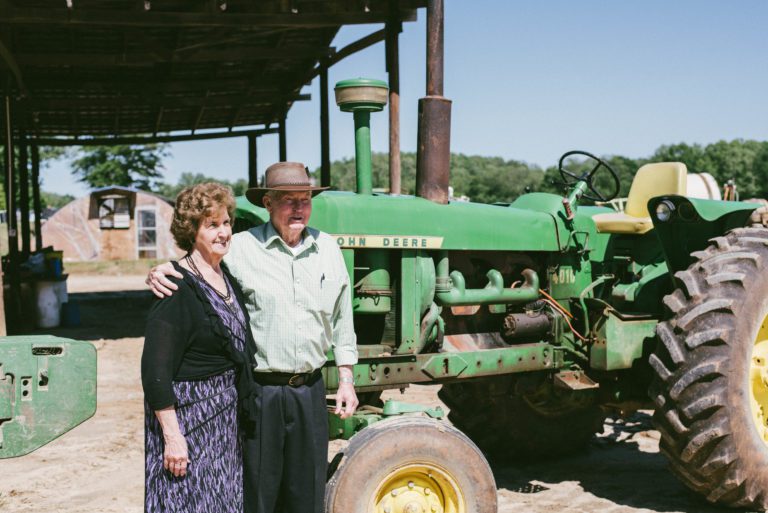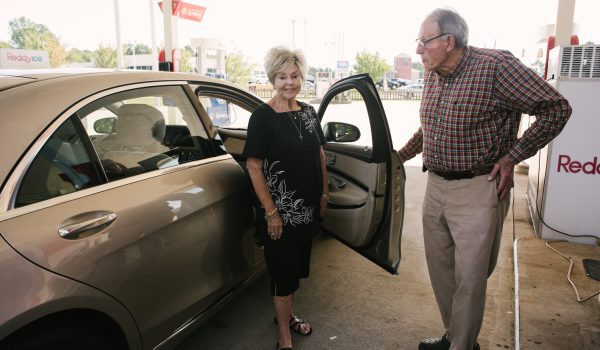We’re gathered around the family’s kitchen table. The patriarch leaning back in his seat, wide grin infectious from the first handshake. The matriarch all smiles and carefully holding the collective memory for the family. Three adult children – daughter, son and son. There’s no mistaking that this is the home of grandparents, of family, of heritage. The family photographs. The history decorating the walls. The grandchildren’s presence made known.
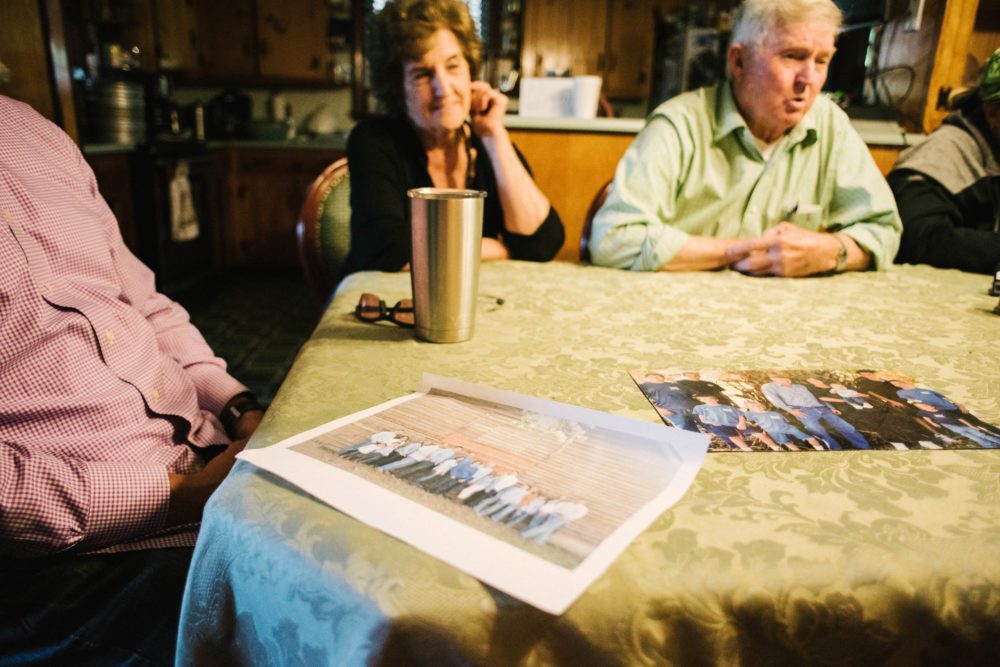
The house lies on the outskirts of the Beechwood Farm property, the farm in full view from the front porch. Like overseers, like watchmen, this family has been working this land and this farm for more than forty years.
Billy and Elizabeth Ledford started small, but they started brave too. Their story spreads across the lifetime of their family, from the two of them as newlyweds to the two of them as grandparents, their three grown children at the table now, more than half a dozen grandchildren and a pair of great grandchildren too – all a part of the fabric of the story that is their farm, their legacy.
It’s a sweeping story and it’s a story that feels hard to contain in a single blog post. We were honored to sit with Billy and Elizabeth, with their children Donna and Brian and Brad, and to spend an hour hearing entertaining and moving word pictures about farming, about pulling together and persevering, about faith and about becoming and staying a family.
Billy Ledford is a force and even sitting at this kitchen table on a quiet Sunday afternoon, you know this to be true. He’s a force, but he’s also a part of a team and it doesn’t take long at all to see that everyone at the table brings value and feels valued.
“Our family is so deep and wide – we spent every Sunday growing up at a grandmother’s house,” Donna, the only daughter, shared. The families are still tight. They all agreed that 60 was an average number of people on a holiday to be at the house. And the Sundays now are spent at the Ledford house at Beechwood.
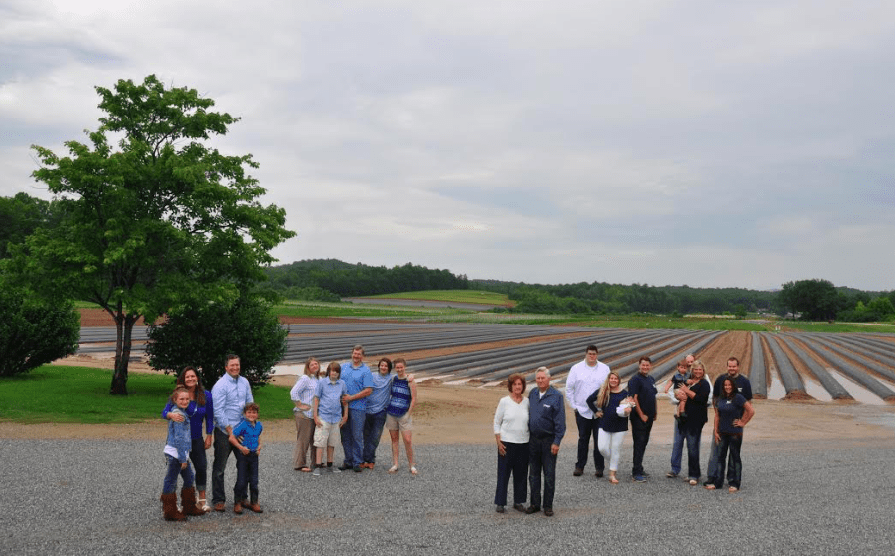
What follows next is a lively discussion of holidays – and my mouth is watering by the time I hear the menu listed that accompanies Christmas – the meals and the stories and the squash recipes.
Donna tells a story that highlights her parents generosity of spirit and love of people. She said any of her friends could spontaneously show up at Christmas and a gift would appear under the tree with their name on it. If you were in the house, you were welcome. “The gift might be a live chicken in a box,” she laughed, “but your name would be called and you’d get something.” We’re pretty sure that the live chicken is less hypothetical and more true story.
How does this work? How does this stick in the society in which we all live today?
“Tradition,” the women’s voices echoed in unison.
Tradition.
“And sacrifice,” Brian, the Ledford’s middle son, quickly adds in. With a strong sense of giving credit where credit is due, Brian says, “The mommas. This happens because the mothers are willing, every weekend, to give of themselves to cook and prepare and serve.” Donna and Brad quickly concurred and admitted that their father, Billy, did often fuss at his wife to do less, a woman who worked full time and then would spend evenings and weekends preparing food for family gatherings. He would encourage her to stop, to take a break.
“This is what I like to do,” the kids all said their mother would always insist. She was so upset about stopping that it almost brought her to tears, Billy chuckled at that memory. “She loves to do it.” Elizabeth is nodding in agreement and everyone at the table, us included, can see the truth behind the comments.
“This was a mother transition – mother to mother. Not a man,” Billy said, in a serious tone he lapses into from time to time in the conversation. “Women play such a critical role – in the church and in the home.”
“The mother is the glue,” Donna spoke up. “But the dad is the backbone, the strength. When the mother is there as the glue and the father is there as the backbone, it sticks.” And these are the types of words that drop like golden nuggets into the entire conversation, weaving their way in and out of the story of the Ledford family.
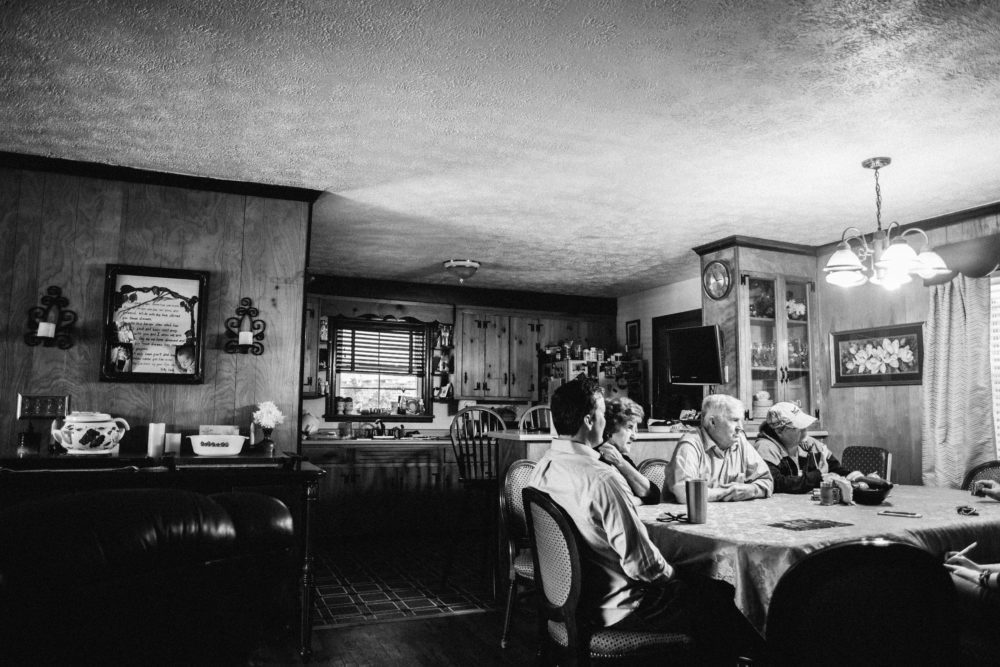
When Billy and Elizabeth both graduated from Slater High School in 1961 they worked three jobs between them. And farmed – so, technically, four jobs. Elizabeth worked as a nurse and Billy worked at Marietta Tire Shop and the mill – an eight hour shift at each job. The forward-thinking couple saved two paychecks and lived on one. It’s easy to hear the pride in the children’s voices as they talk about the early days of their parents, before they themselves were even in the family picture, clearly a legacy of hard work and commitment to a goal that has carried right on into their DNA as well.
“I was driven,” Billy recalls, leaning back from the table’s edge. “I wanted to be my own boss. I wanted to be responsible for things. But I learned something really quickly. I learned that they don’t make no man that’s his own boss.” Billy’s tone is the perfect blend of Southern and parental and you can’t help but listen a little closer when he takes the floor. “Every human being, even the president, has to answer to other people. Your partners, your crop. Things boss you all the time. I decided then that I was going to work with people. That’s not a play on words – it sounds like a play on words. No man in America works for somebody else. He works for hisself WITH someone else. That’s not a play on words – that’s a fact. If you’re working FOR someone else, you give it all to that person, you give them all your talents and all you earn. We don’t do that. We use it for ourselves, but we do have the great pleasure of working WITH people.”
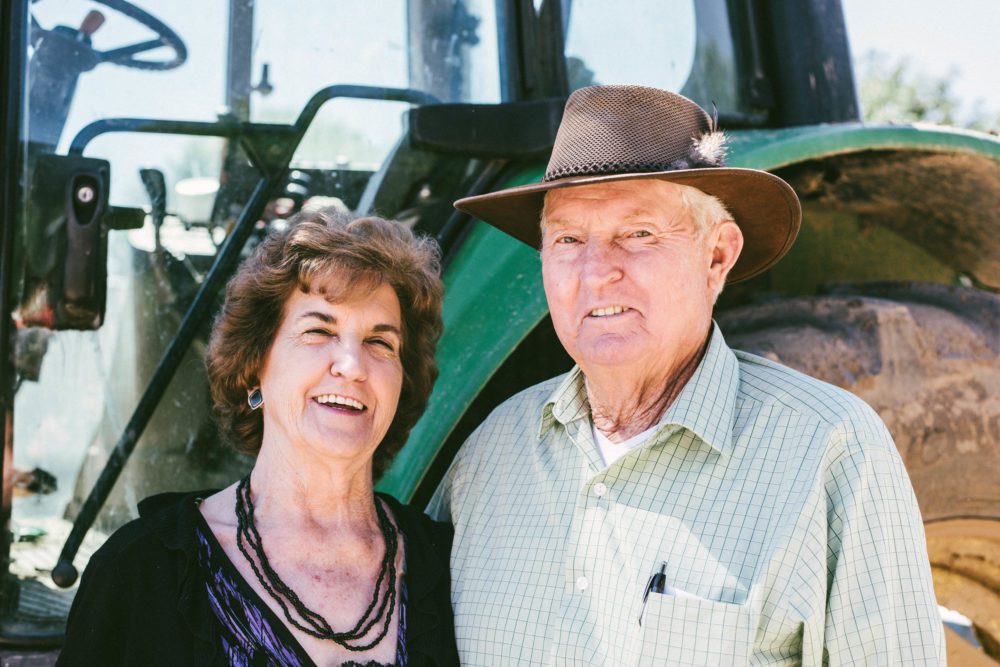
Somehow, when Billy finishes this thread of thought, you feel like you’ve been in some sort of school, as if you’d be wise to jot his words down.
Eventually, through years of labor and saving, Billy and Elizabeth stopped working all the extra jobs and were able to farm full time. They started with pole beans as their first crop.
Sometime around 1963, Billy said his mother co-signed a loan with him so he could purchase $20,000 worth of equipment, including a John Deere tractor that is still in use at the farm today.
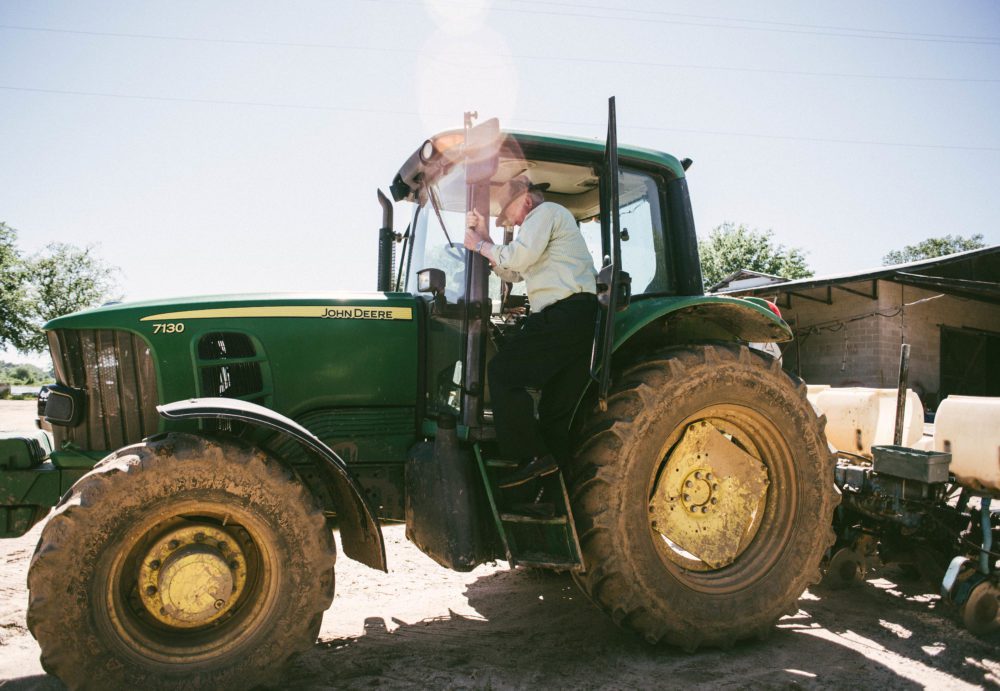
By this time in the story the three Ledford children had been born and, it shouldn’t come as any surprise, they were always involved in farm life since early childhood.
“The only thing we left the farm for was church,” Donna said. The kids all agreed that Dad never left the farm – not to buy clothes, not to do anything. “Well, he did leave for basketball,” Brad laughed. But that was a church league and it only happened during the winters.
Some good natured ribbing ensued about the baby of the family – Brad – getting to play sports when the older kids did not. (And it’s clear to see the birth order without even asking.) “Brad got to count sports as summer work,” Donna laughed. “I never had that option.” It feels like a classic first born comment.
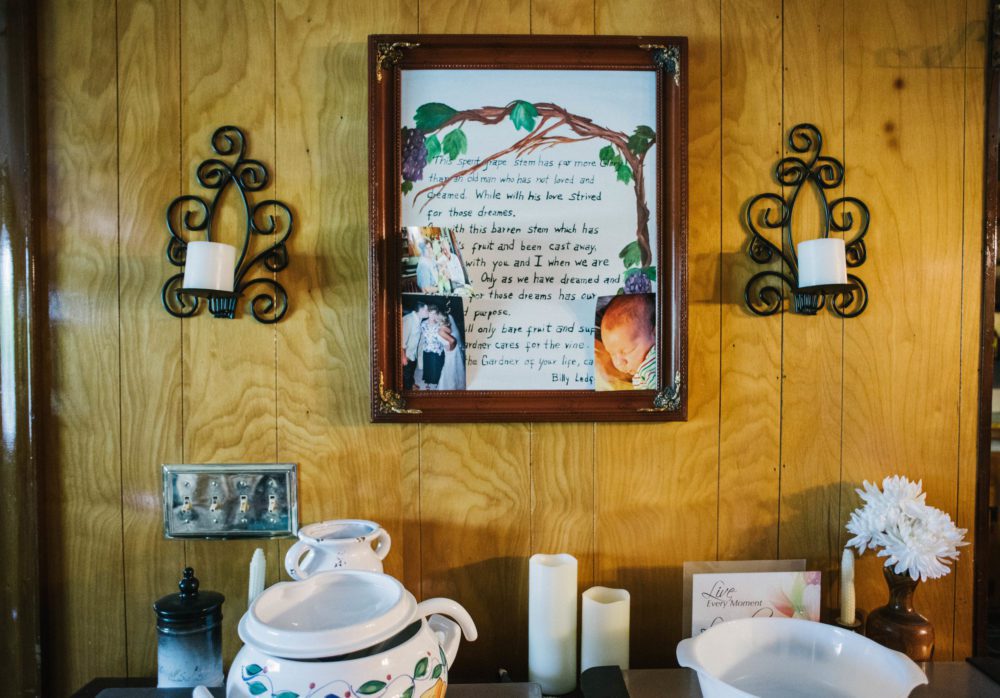
“We started working at 8 years old, then started at the farm in the summers at 10 years old,” Donna explained. There was not only a plan for work, there was a family plan for the money the kids made at the job too. 10 percent to church, 50 percent to savings, 40 percent to splurge. The plan worked well, though. Donna bought her first house when she 18 years old. (And she taught her three sons the same financial ethics because her boys have followed closely in her footsteps with early home ownership and savings.)
“I spent most of my childhood picking field beans,” Donna said.
Elizabeth is always helping to get the story straight, keeping the rails on the track, using gentle hand motions, working out the details, ironing out the story as we all talk.
“I had blisters on my hands from hoeing, they would start to bust and bleed,” Donna said, “And Daddy would say – you do it again. When you learn how to hoe that row right, you can apply yourself in any job, you’re going to keep doing it until you do it right.”
In 1973 Billy’s sister Judy Best became a partner and she helped manage the fields and then eventually moved into being a partner in the pole beans – she had a crew of her own.

At some point in the family history, Billy grew crops for his mom and his sister, on several bits of land, with each of those women running the crews themselves.
The farm’s next crop was tomatoes – hundreds of acres of Big Red tomatoes.
A big discussion begins of what came first – strawberries vs. tomatoes. This topic veers into which market was first and when did they begin selling their produce down at Echo Valley. They work it all out and we could transcribe the entire conversation, but it’s not the real story here, is it?
The Roadside Market that is currently at Beechwood Farms started in 1979. Before that the fields were gleaned after all of the produce was picked for the markets where the produce was all sold and shipped. “I would just be waiting on the side of the road – I don’t even know how people found us because it was before cell phones, but they sure would find us and come and glean the fields,” Donna said.
Elizabeth and Billy are unofficially retired now, but only in theory. They aren’t really ready at all to concede to that title of retirement. Donna is Beechwood’s Field Manager and Brian and Brad are partners in the business as well. Beechwood Farms is absolutely still a family business.
All of the grandchildren have worked at the farm, the youngest grandson just this year having the opportunity to haul strawberries and hand out baskets.
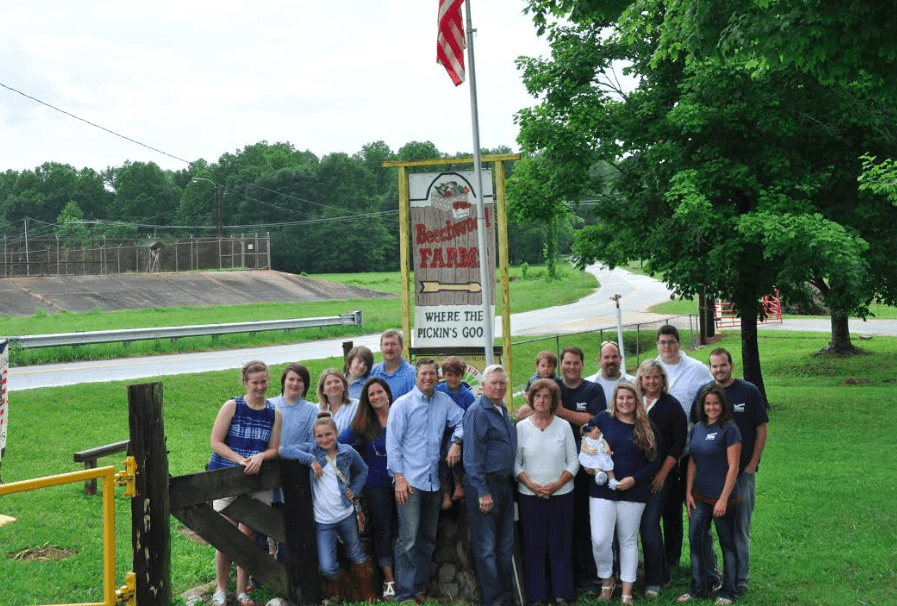
Donna was running her own crew at Beechwood at 15 years old, driving a giant truck on the road. Donna speaks fast and sure, and without even asking, I am confident that she works at the same level.
Married and with three sons, Donna farmed on her own for a while. Early on she grew grape tomatoes and became a major supplier for many markets, including Wendy’s and Ingles. She has never not farmed, actually, even though she has been a long time teacher as well. Since she was eight year old, Donna has been raising cops and working on a farm. Through a career of teaching and a lifetime of raising three sons, she has always been a farmer.
And then the momma and daddy pride come out clear and true as Billy and Elizabeth quickly sing her praises – how she is strict but so beloved in her field of teaching. The awards and honors she has received over the years in the school system. Their smiles and their words – they’re speaking all the volumes you could hear.
“I taught and teach for my heavenly father and I farm for my earthly father,” Donna said.
You can see the birth order come out even at this table. Donna – the oldest, the running of the classroom and the field and the business – running it all in the same effective manner. Brian – the middle, following his dad around the farm a lot, learning how to weld, how to work in the shop on tools and equipment, honing in on his engineering mind. Brad – the youngest, kept by his mother’s side as the baby of the family, learning all of the accounting and book keeping. And, as adults, they’ve developed careers based on thes skill sets acquired as children on the farm. “And then we all have these specific talents to bring back to the farm,” the kids agreed, easily seeing the value in each of the other’s skill sets. From this end of the table, it’s easy to see a team, a team in both family and in function.
And it’s not just the children of Billy and Elizabeth Ledford that are in the family business – it’s their spouses and their children too, some extended family and relatives as well. “It takes a village,” they all laughed. And they have that village.
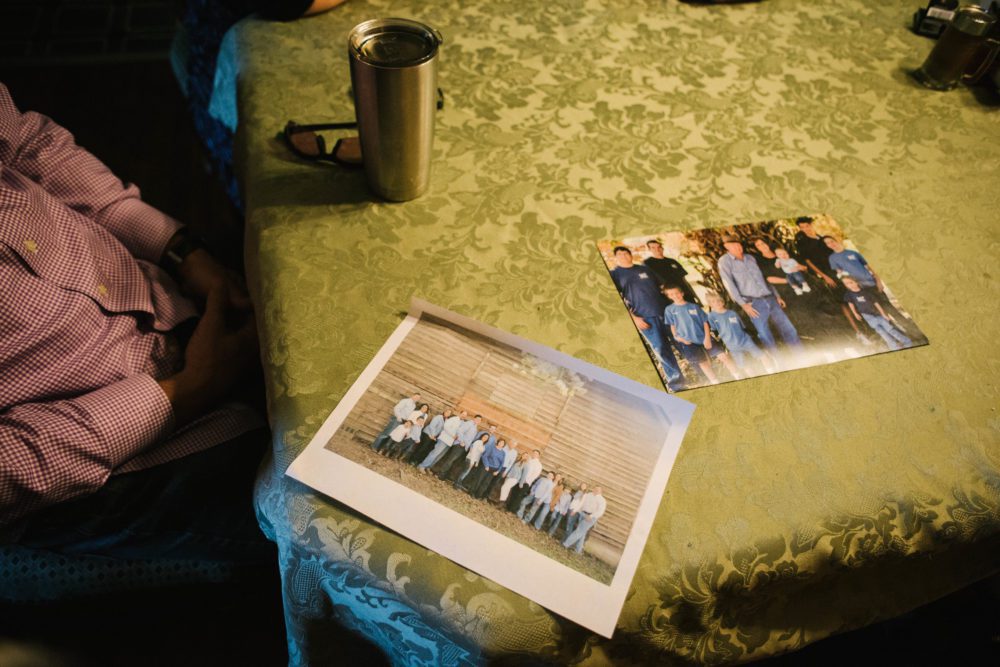
Currently Beechwood Farms spreads over 200 acres with 60 crops and 120 varieties of produce.
The Roadside Market is open every day of the week (except Sundays) from 8 am to 6 pm and you can buy the produce already picked or you can pick many of the varieties yourself. You can enjoy the full farm experience and, of course, the farm is a very family-friendly place. There is a playground by the market and picking your own produce is certainly a family bonding experience – as well as an educational opportunity. A CSA is currently in the works through Beechwood and farm tours and classes are available.
The Ledford family has its eyes on the future though – and on the family, of course. They are already planning new crops of figs and blackberries, for the grandchildren – and the great grandchildren – crops that take years to mature and produce, confident that in those years the grandchildren, the next generation, will be there to harvest and to pick and to be family at the farm.
__________________________
Throughout the interview, Billy would spout out these quote worthy phrases, sayings that you could tell were as familiar to his children as a farm fresh tomato in June or their own last names.
We couldn’t resist compiling a few of these together here for you. (And we also couldn’t resist wishing we could have a Billy Ledford as our relative somehow, his wisdom and his wit and his love of his people were as clear as a summer sky, and as welcoming too. In fact, sitting at this family’s table made us want to try to rustle up a spot at one of their holiday gatherings, even if it means bringing home a live chicken afterwards.)
“Never ever get caught knocking one of your family members. Don’t do it. If you want to wreck your family, after y’all part, you go running down somebody, or talkin’ about how triflin’ they are. And I don’t care how triflin’ they are. You cannot discuss it. You accept it and go on with it.”
“If you hear anybody say anything ugly about me, do me a favor. Don’t defend me. Don’t say nothing. They will shut up. Every time. If somebody is saying something negative about somebody, you just act like you’re not interested. You certainly don’t respond by throwing a log on the fire. That’s a killer.”
“You take a strong work ethic, you take that into your industry, that surpasses any intelligence you want to reasonably offer up. A genius cannot compete with even an average intellect if that person is committed to work. You take that ethic and put it into any field you’re in, and you’ll prosper.”
__________________________
Find out more about Beechwood Farms on their website.
Follow them on Facebook and Twitter.
__________________________
Photos Taken by Jane Howard

